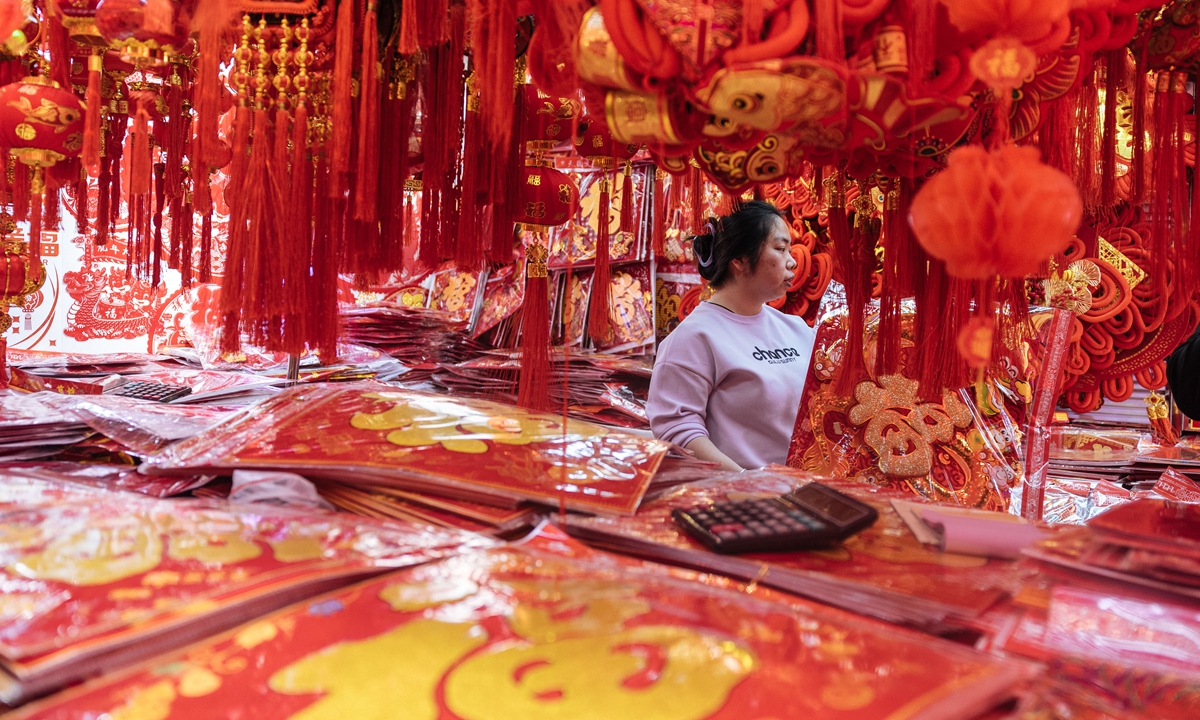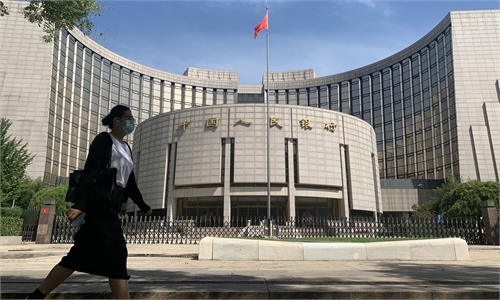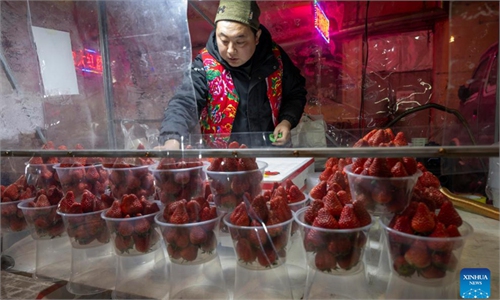New Dynamics in New Year: Bustling market days for Spring Festival mirror China’s economic vitality

A resident shops for goods in a shopping mall in Fengtai District, Beijing, on January 28, 2024, in preparation for the Spring Festival in February. Photo: Li Hao/GT
As 2024 Spring Festival approaches, a number of cities across the country have held exhibitions and fairs for the upcoming shopping spree, attracting numerous consumers and merchants from home and abroad to jointly celebrate one of the most important holidays in the country.
"This is my first time attending a shopping fair, and I'm mainly here to look at agricultural products, as many of them are directly sourced from the farmgate, ensuring better quality," Wang Yijie, a consumer who visited a shopping exhibition in Beijing Workers' Stadium, told the Global Times on Sunday.
Recently, two shopping exhibitions for the Spring Festival are being held in Beijing, one in the National Agricultural Exhibition Center and another in the Beijing Workers' Stadium. Both fairs will last until February 6, 2024.
When visiting the Beijing Workers' Stadium, the Global Times reporters found that the event was packed with people in high spirits. The merchants set up their booths early and filled them with a dazzling array of goods for the Spring Festival. While consumers gathered around the booths, some savored the treats and others browsed festive decorations.
Over the past year, China has seen a stable rebounding in its consumption sector. Final consumption contributed 82.5 percent of overall GDP growth, while retail sales set a new record of 47.15 trillion yuan ($6.62 trillion), data from the National Bureau of Statistics revealed.
The recent three-day New Year's Day holidays signaled a good start for China's consumer spending recovery this year, experts said, noting that the country is expected to embrace a consumption boom during the Spring Festival, the Chinese Lunar New Year which falls on February 10 this year. The consumption will continue to play a vital role in bolstering economic development in 2024, with its contribution to the GDP growth expected to remain at a high level.
Preparations for the new year
In the Beijing Workers' Stadium, gourmet delights became the theme of the shopping fair. As soon as the stadium opened its doors, it ushered in a large number of consumers. Small chickens, cattle tendons, donkey meat, sea cucumber from Dalian, Northeast China's Liaoning Province, sausage from Southwest China's Sichuan Province... the crowded booths were filled with local specialty from all over the country.
"The fair is quite novel. It not only sells agricultural products that middle-aged and older people like but also introduces many imported products like wine and coffee, which are not commonly seen in traditional fairs. Buying these international products at our doorstep is a unique experience. China's further opening-up has also brought a new look to the holiday market," one shopper surnamed Chen told the Global Times on Sunday.
In addition to gourmet delights, the exhibition also features daily necessities and decorative items such as pots and pans, cashmere carpets, and stringed accessories. In the folk crafts section, merchants hang rows and stacks of big red paper cuttings, couplets and Chinese knots, making the Spring Festival atmosphere coming alive.
Another shopping exhibition is being held at National Agricultural Exhibition Center in Beijing, from January 13 to February 6, which gathered over 600 enterprises across China presenting their local products to Beijing residents.
Li Shurui, a representative from Inner Mongolia Guomao Co that assisted the fair told the Global Times on Sunday that the fair has been held for 27 times before 2024, and this is the first after the COVID-19 pandemic.
The exhibition is quite popular among Beijing residents, "especially some local products from other provinces were quickly sold out, which represented a strong consumption power that meets our expectations," Li said.
In addition to Beijing, a number of cities including Haikou in South China's Hainan Province, as well as Harbin in Northeast China's Heilongjiang Province have kicked off shopping fairs for the Spring Festival holidays.
Located in the downtown Harbin, the Hongzhuan Morning Market, which opens between 5.30 am and 9 am, has been one of the most popular local morning markets to attract tourists recently.
Food stalls serve local breakfast dishes such as sticky steamed buns stuffed with bean paste, corn porridge, fresh local delicacies including mushrooms, special frozen fruits. Shoppers are checking items such as household goods for the Spring Festival in the less than 200-meters length of Hongzhuan street in downtown Harbin, where people can discover the hustle and bustle of the city life and feel the hospitality of the local community.
"As the nation's most important festival is approaching, more and more people are coming to the market for shopping, this year's market is extraordinarily busy as many tourists from all around the country are flocking to Harbin for a taste of local delicacies," a vendor surnamed Li told the Global Times.
Unleash consumption potential
"The bustling scenes of shopping exhibitions mirror the continuous recovery in China's consumption sector in 2024," Wang Peng, an associate researcher with the Beijing Academy of Social Sciences, told the Global Times on Monday.
The bustle of the Spring Festival is not only due to material needs of people, but also because of public expectations toward long holidays as well as family reunions, which are part of the tradition for the festival. These expectations were released after three years of battling against the pandemic and translated into actual purchasing power, further contributing to the recovery of consumption, Wang said.
Promotional activities such as the Spring Festival shopping exhibitions help to cultivate the consumption market and increase market confidence, laying a good foundation for long-term market development, Wang noted.
In an exclusive interview with Steven Alan Barnett, senior IMF resident representative in China, he told the Global Times that the pattern - household consumption growing faster than GDP - would be one key aspect in China's economic recovery in 2024.
On Friday, the Ministry of Commerce declared 2024 the "Year of Promoting Consumption" and stressed the need to strengthen economic momentum. The ministry said it would continue to relax restrictions on foreign investment and improve the business environment in order to attract more investment.
The government's policy has an important impact on the development of the market. If the government continues to introduce policies favorable to consumption, the consumer market is expected to maintain steady growth and its contribution to GDP growth will remain at a high level, Wang said.
The tone-setting Central Economic Work Conference held in Beijing in December 2023 pointed out that the central government will focus on expanding demand in 2024, shifting consumption from post-pandemic recovery to sustained expansion.
Wang noted that authorities should actively cultivate new consumption areas, such as smart home appliances, health and wellness and other emerging fields, to inject new vitality into the consumer market.


